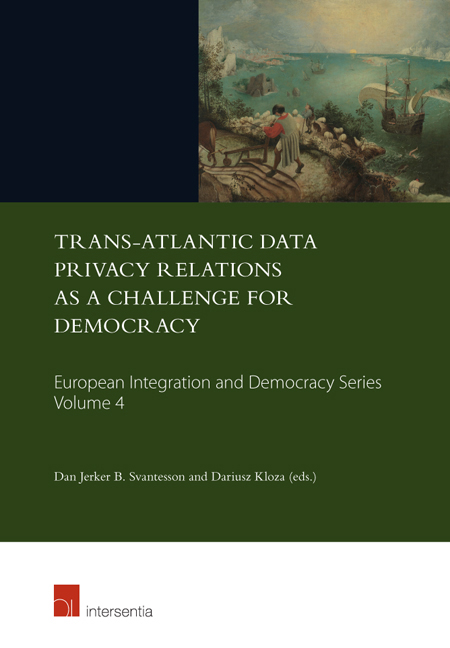Book contents
- Frontmatter
- Foreword
- Preface
- Contents
- List of Abbreviations
- PART I PRIVACY AND …
- SECTION I PRIVACY AND TRANSBORDER FLOWS OF PERSONAL DATA
- INVITED COMMENTS
- SECTION II PRIVACY AND INTERNATIONAL TRADE
- INVITED COMMENT
- SECTION III PRIVACY AND TERRITORIAL APPLICATION OF THE LAW
- SECTION IV PRIVACY AND CRIME
- INVITED COMMENTS
- SECTION V PRIVACY AND TIME INVITED COMMENTS
- 15 Does It Matter Where You Die? Chances of Post-Mortem Privacy in Europe and in the United States
- 16 The Right to be Forgotten, from the Trans-Atlantic to Japan
- PART II THEORY OF PRIVACY
- PART III ALTERNATIVE APPROACHES TO THE PROTECTION OF PRIVACY
- INVITED COMMENT
- CONCLUSION
15 - Does It Matter Where You Die? Chances of Post-Mortem Privacy in Europe and in the United States
from SECTION V - PRIVACY AND TIME INVITED COMMENTS
Published online by Cambridge University Press: 29 September 2018
- Frontmatter
- Foreword
- Preface
- Contents
- List of Abbreviations
- PART I PRIVACY AND …
- SECTION I PRIVACY AND TRANSBORDER FLOWS OF PERSONAL DATA
- INVITED COMMENTS
- SECTION II PRIVACY AND INTERNATIONAL TRADE
- INVITED COMMENT
- SECTION III PRIVACY AND TERRITORIAL APPLICATION OF THE LAW
- SECTION IV PRIVACY AND CRIME
- INVITED COMMENTS
- SECTION V PRIVACY AND TIME INVITED COMMENTS
- 15 Does It Matter Where You Die? Chances of Post-Mortem Privacy in Europe and in the United States
- 16 The Right to be Forgotten, from the Trans-Atlantic to Japan
- PART II THEORY OF PRIVACY
- PART III ALTERNATIVE APPROACHES TO THE PROTECTION OF PRIVACY
- INVITED COMMENT
- CONCLUSION
Summary
When people compare the differing concepts of data privacy in Europe and the United States, along with the different systems of legal and practical protection associated with them and the respective frameworks of informational selfdetermination, they invariably think of the privacy rights of living persons One of the reasons they do this is because in public thinking, the notion of privacy is closely bound up with the actual life circumstances, expectations and rights of living persons, and the value represented by privacy is, manifestly or latently, important for people who are alive The other reason is that in most of the countries where data protection rights have been enacted, the concept of personal data is limited to information associated with living persons Nevertheless, one's personal uniqueness, or unique personality if you like, does not vanish with death: for the relatives and the personal friends, as well as the professional community and cultural memory, or indeed in a broader sense for society as a whole, the essence of a human being is more than the biological functioning of an organism, and it lives on aft er the stoppage of the biological machine We ought to picture this as a comet in the sky: the radiant nucleus represents the human essence of a living person, and its long tail symbolises the personality left behind aft er death: as time passes, this remnant of personality becomes less and less linked to the human essence of the deceased, in much the same way that the end of the comet's tail gradually melts into the dark sky.
THE LEGAL LANDSCAPE
Some of the problems concerning the protection and regulation of the gradually impersonalised information relating to deceased persons are adequately resolved by the traditional institutions of law, both within the national frameworks and in the international context: two examples – important on account of their financial implications, besides anything else – are intellectual property right and copyright The bequest of persons living in today's networked society includes informational items the legal regulation of which is currently underway, although the formation of a unified approach to it is admittedly still further down the road.
- Type
- Chapter
- Information
- Publisher: IntersentiaPrint publication year: 2017
- 1
- Cited by

